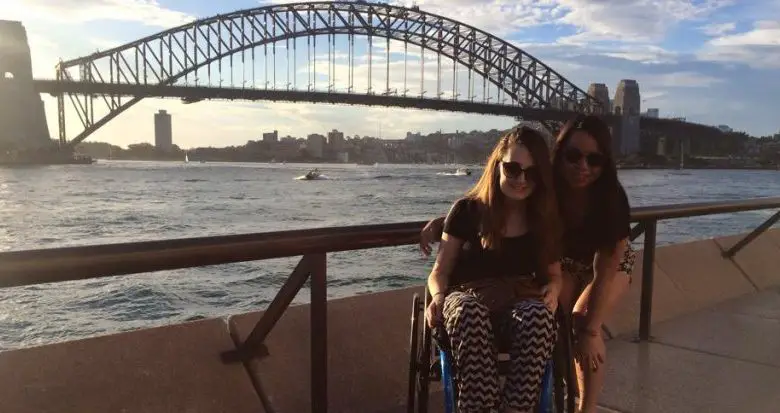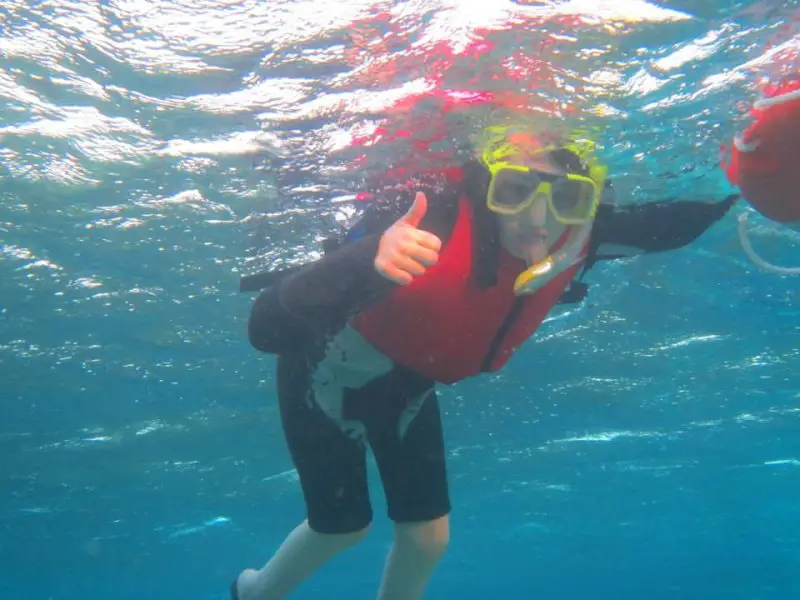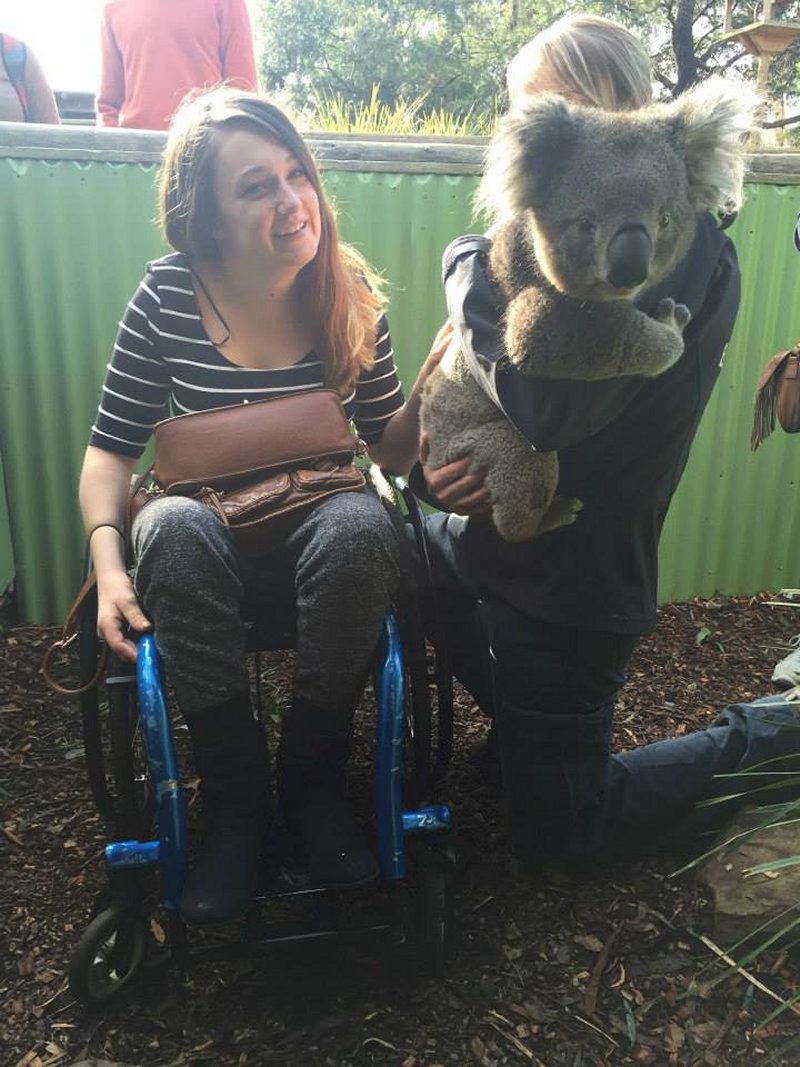
My perspective on inclusive study abroad
Shannon Kelly is stydying journalism at the University of Illinois at Urbana-Champaign. She has a passion for travel, loves animals, and never turns down an adventure.
Even though traveling in a wheelchair can be difficult, it is also extremely worth it. #GenerationStudyAbroad
Looking back on my past three years of college, I can easily say that some of my fondest memories are from the study abroad trips that I’ve been on. It’s crazy to think that this time three years ago I had never been out of the country. It’s even crazier that since the summer of 2012, I have been on four different trips abroad.
It all started the summer after I graduated high school. I wanted to do something big and exciting before I started college in the fall. Going out of the country for the first time seemed like a good idea. My friends and family were not interested in traveling at the time, so I was on my own. I was 17, in a wheelchair, and a newbie to international travel, but I didn’t want to let any of these things stop me from having the adventure of a lifetime.
Once I decided to pursue my dream to travel, I had to do my research. I’m pretty sure that ‘wheelchair accessible travel’ was one of the first things I typed into Google. I was directed to Mobility International USA, which is an organisation committed to fighting for the rights of people with disabilities on a global level. I explained my situation to one of the staff members, and they recommended different international programs that have been accommodating. I ended up choosing a three-week volunteer program in Costa Rica.
My trip to Costa Rica has been one of the most challenging experiences I’ve faced to date. Since it is a developing country, the infrastructure of the community we were living in made it hard for me to get around. There were steps to get into many of the buildings, unpaved sidewalks with no curb cutouts and hills. From the second my plane landed, I had to rely on complete strangers to help me get anywhere I wanted to go.
Despite this, with the help of the other program participants and staff, I was able to see the Irazu Volcano, swim in the La Fortuna Hotsprings and even go bungee jumping. This trip made me realize that even though traveling in a wheelchair can be difficult, it is worth it to discover the beauty of other countries and the cultures that come with them.
From the moment I returned home, I knew I was going to be a traveler for life. With close to 200 countries in the world, life is just too short to be spent in one place. And luckily for me, my next trip abroad was sooner than I thought. I was working out with my physical therapist one day when she started to tell me about a faculty-led trip to South Africa. The trip was focused on learning about families in another part of the world. It had an eight-week pre-departure course, which focused on learning about South Africa, and then a three week trip to Cape Town. Two weeks focused on volunteering in different community organisations and one week was dedicated to travel. The professor had done this trip numerous times before, and wanted to make it inclusive for a student in a wheelchair.
Of the four trips I have been on, this one would probably be my favorite. One of the things that made this trip great was how inclusive it was. We all shared rooms in a hostel, so as a group we got really close. Cape Town had some of the same accessibility issues as Costa Rica, but this time around I had lots of people willing to help me since we there as a group.
Another great part about this trip was all the planning our professor Jan put into making this trip possible. She visited all the hostels, volunteer placements, restaurants, museums, and tourist attractions to make sure they were do able in a wheelchair. Planning is definitely the key to successful accessible travel. Although it takes more time and effort up front, it makes the trip go so much smoother during your time traveling.
I should’ve taken my own advice for my most recent trip to Sydney, Australia. We decided to stay in an Airbnb and when I contacted the owner he said that the apartment was accessible. However, when we got there we discovered that all the nearby train stations did not have elevators to get down to the platforms. This made traveling from place to place a struggle. This could’ve been easily avoided by finding an apartment near train stations that were accessible. I learned my lesson the hard way.
About a year after my trip to Cape Town, I went on another faculty-led program to Stockholm, Sweden. One of the unique things about this trip, is that I was able to receive a scholarship to help fund the trip. The University of Illinois recently established an Enabled Abroad fund specifically for students with disabilities. The focus of this scholarship is to encourage more students with disabilities to go on study abroad trips. In return for the scholarship, you have to do some kind of project to tell about your experience and promote the purpose of the Enabled Abroad. With the help of the Enabled Abroad, I was able to go to Sweden, where we spent the week comparing marketing techniques in the food industries in the US and Sweden.
After returning from Sweden, I decided that I wanted my next journey to be a bit longer. Costa Rica, South Africa, and Sweden were great, but I was only in each country for a few weeks. I wanted to live in a country for an extended period of time and truly be immersed in the culture. After lots of consideration, I decided to apply to the University of Melbourne for a semester. Once my application was finished, my work wasn’t over. I had to find accessible accommodation for the semester, a place that I could exercise with assistance and figure out what classes I wanted to take.
When I first arrived in Melbourne, it felt like freshman year of college all over again. I had to make a new group of friends and find my way around all while adjusting to the new culture. I’ll be honest, the first few weeks were rough. The city of Melbourne wasn’t the easiest for me to get around. It is very hilly and not all the trams and buildings were accessible. I was worried that I wasn’t going to be able to experience everything I wanted to due to accessibility and that I wasn’t going to have people to travel with. I began to wonder if I made the wrong decision.
Slowly but surely, things started to turn around. I made friends who accepted me and were willing to take the extra time to wait for an accessible tram and help me into tricky buildings. Since February I’ve traveled around the country and experienced beautiful nature in Tasmania, the Habour Bridge in Sydney, and the Great Barrier Reef in Cairns.
I have less than a month left in Australia, and I’m trying to take in everything this country has to offer. My time here has been amazing, but I don’t want to sugar coat it. It has been difficult. It’s annoying to have to find accessible hostels, and to struggle pushing up hill, and to have to ask random strangers for help. Sure, I wish I could walk carelessly down the beach, and go hiking and surfing and travel more spontaneously. This experience has taught me to accept what I cannot change, and embrace all the things I can do.
I believe that everyone should study abroad during college. Each trip I’ve been on has taught me something new and helped me grow as a person. As a society, in order for study abroad to be more inclusive for students with disability I think two things need to happen.
First, cities need to keep striving to make things more accessible. More accessible buildings and public transportation makes it easier for people with disabilities to be independent.
Additionally, I think acceptance is something we need to work on as well. A big part of study abroad is being able to accept people who are different than you and to keep an open mind. I have made amazing friends while abroad this semester, but that didn’t happen over night. If people were more accepting of differences, I think study would be more enjoyable for everyone.
When I started college in fall of 2012, I had no idea how much of an impact the University of Illinois’ study abroad programs were going to have on my life. In the past three years I have been able to experience incredible cities and cultures that have taught me invaluable lessons. Although traveling with a disability can be challenging, it is not impossible. I look forward to being a traveler for the rest of my life, and I can’t wait to see where my next adventure takes me.
By Shannon Kelly
First published on the College Tourist website.
Tell us about your travels by messaging us on Facebook, tweeting us @DHorizons, emailing us at editor@disabilityhorizons.comor leaving your comments below.
If you’re planning your next holiday, why not visit our new travel site, Accomable, to find accessible accommodation not just in the UK, but across the world.

